With his all-American good looks, Robert Redford (1936-2025) was one of the biggest Hollywood stars of the 1970s. Last Tuesday, 16 September, he passed away in his sleep at his home in Provo, Utah, USA. In classics such as Butch Cassidy and the Sundance Kid (1969), The Sting (1973), and All the President's Men (1976), Redford portrayed the intelligent, reliable, and sometimes sardonic good guy. He received two Oscars: one in 1981 for directing Ordinary People, and one for Lifetime Achievement in 2002. In 2010, the actor, director, producer, businessman, environmentalist, philanthropist, and co-founder of the Sundance Film Festival was appointed Chevalier of the Légion d'honneur in France. Robert Redford was 89.
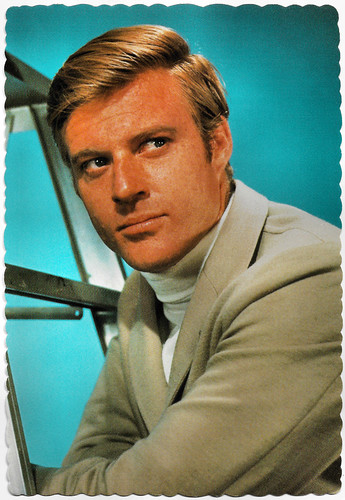
Canadian postcard by Fan Club, no. PC8.
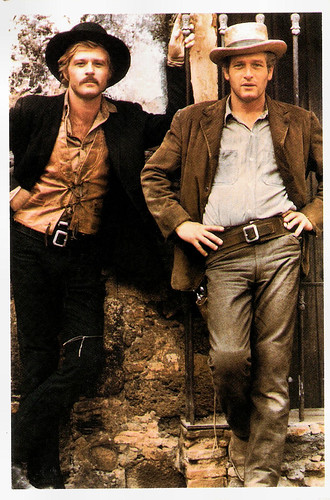
American postcard by Fan Club Post Cards, New York, N.Y., no. PC 22. Paul Newman and Robert Redford in Butch Cassidy and the Sundance Kid (George Roy Hill, 1969).
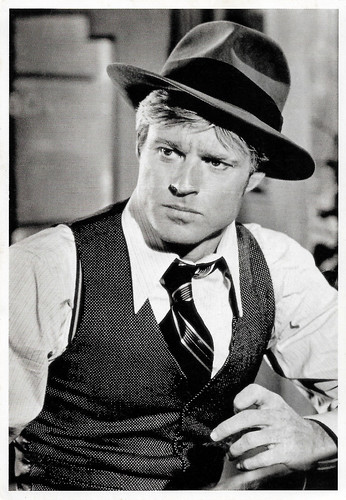
French postcard in the Collection 'Portraits de Cinema' by Editions Admira, Aix-en-Provence, Serie 6, no. 1 / no. PHN 863. Photo: SNAP Photo / Cosmos. Robert Redford in The Sting (George Roy Hill, 1973).

British postcard by Star-Graphics, London, no. S 90. Sent by mail in 1997. Robert Redford in The Electric Horseman (Sydney Pollack, 1979).

French postcard by Media Comm +, no. F.K. 34. Robert Redford in The Natural (Barry Levinson, 1984).
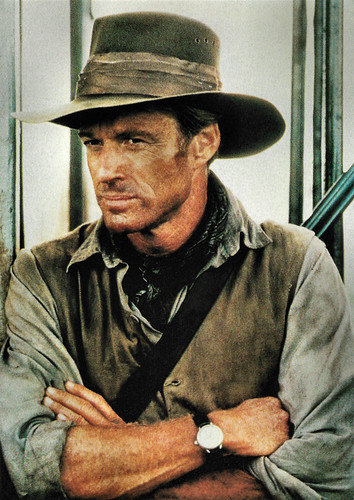
Italian postcard by Vitorius Roma, no. VR 499. Robert Redford in Out of Africa (Sydney Pollack, 1985).

Vintage postcard. Photo: Universal / UIP. Robert Redford in Legal Eagles (Ivan Reitman, 1986).
Charles Robert Redford Jr. was born in Santa Monica, California, in 1936. His parents were Martha W. (Hart) and Charles Robert Redford, Sr., a milkman who later worked as an accountant for an oil company. Redford's family moved to Van Nuys, California, while his father worked in El Segundo. He attended Van Nuys High School and was interested in art and sports. In 1954, Redford graduated from Van Nuys High School. But his mother died in 1955 from septicemia, and a deeply grieving Redford felt lost emotionally.
Redford won a baseball scholarship to the University of Colorado, but he did not distinguish himself as an athlete there. Instead, "I became the campus drunk and blew out before I could ever get going," he told People magazine in a 1998 interview. After one and a half years, he decided to become an artist and moved to Europe. His time travelling through Europe was an eye-opening experience for the young Redford, who lived the life of a bohemian. When he returned to America a year and a half later, he was much more focused on my country culturally and politically. He decided on a career as a theatrical designer in New York City, but enrolled at the Pratt Institute and then the American Academy of Dramatic Arts, switching from design to acting.
In 1959, Redford's acting career began on stage, making his Broadway debut with a small role in the comedy 'Tall Story'. It was followed by parts in 'The Highest Tree' (1959) and 'Sunday in New York' (1961). On TV, he appeared as a guest star on numerous programs, including Maverick (1960), Perry Mason (1960), The Twilight Zone (1962), and The Untouchables (1963). Redford earned an Emmy nomination as Best Supporting Actor for his performance in The Voice of Charlie Pont (Robert Ellis Miller, 1962), starring Bradford Dillman.
Redford made his screen debut in War Hunt (Denis Sanders, 1962), set during the last days of the Korean War. This film also marked the acting debut of director Sydney Pollack, with whom Redford would collaborate on seven films. His biggest Broadway success was as the stuffy newlywed husband of Elizabeth Ashley in Neil Simon's 'Barefoot in the Park' (1963), directed by Mike Nichols. After this smash hit, he was cast in larger film roles. In the war comedy Situation Hopeless ... But Not Serious (Gottfried Reinhardt, 1965) with Alec Guinness, he played a soldier who had to spend years of his life hiding behind enemy lines.
In Inside Daisy Clover (Robert Mulligan, 1965), he played a bisexual movie star who marries starlet Natalie Wood. It won him a Golden Globe for the best new star. A success was This Property Is Condemned (Sydney Pollack, 1966), again with Natalie Wood. The same year, he co-starred with Jane Fonda in The Chase (Arthur Penn, 1966), also with Marlon Brando. Fonda and Redford were paired again in the film version of Barefoot in the Park (Gene Saks, 1967) and were again co-stars much later in The Electric Horseman (Sydney Pollack, 1979).

Romanian postcard by Casa Filmului Acin, no. 633. Jane Fonda and Robert Redford in Barefoot in the Park (Gene Saks, 1967).

French postcard by Editions F. Nugeron, no. Stars 69. Photo: J. Ritchie.
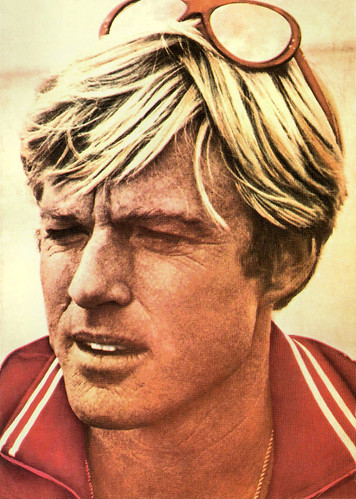
Romanian postcard by Casa Filmului Acin.
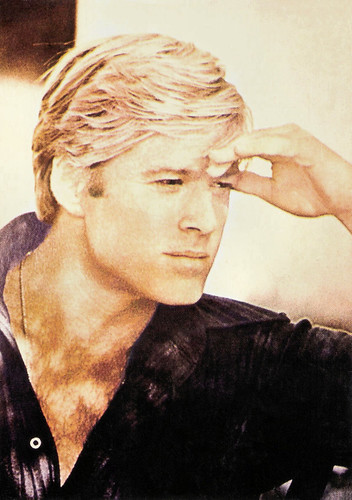
Romanian postcard by Casa Filmului Acin.

Romanian postcard by Casa Filmului Acin, no. 491. Photo: Barbra Streisand and Robert Redford in The Way We Were (Sydney Pollack, 1973).

Romanian postcard by Casa Filmului Acin.
After this initial success, Robert Redford became concerned about his stereotype image of the blond 'All American'. At the age of 32, he found the property he was looking for in Butch Cassidy and the Sundance Kid (George Roy Hill, 1969), scripted by William Goldman. For the first time, he was teamed with Paul Newman. In the film, he played the outlaw known as the Sundance Kid while Newman portrayed Butch Cassidy. The two proved to be a dynamic duo onscreen and forged a lasting friendship, with the film enjoying both critical and commercial success. Butch Cassidy and the Sundance Kid made him a major bankable star.
Redford sought out more challenging fare and avoided trading on his sex appeal. Critical and box office hits were Jeremiah Johnson (Sydney Pollack, 1972), the hugely popular period drama The Way We Were (Sydney Pollack, 1973) with Barbra Streisand, and the blockbuster crime caper The Sting (George Roy Hill, 1973), the biggest hit of his career, for which Redford received his first Oscar nomination.
Between 1974 and 1976, exhibitors voted Redford as Hollywood's top box-office name with such hits as The Great Gatsby (Jack Clayton, 1974) and the CIA thriller Three Days of the Condor (Sydney Pollack, 1975) with Faye Dunaway.
The popular and acclaimed All the President's Men (Alan J. Pakula, 1976), scripted once again by William Goldman, was a landmark film for Redford. He and Dustin Hoffman played reporters Bob Woodward and Carl Bernstein in an acclaimed drama about the Watergate scandal. He was also the executive producer, and the film's serious subject matter and its attempt to create a realistic portrayal of journalism reflected the actor's offscreen concerns for political causes.
Redford also appeared in the war film A Bridge Too Far (Richard Attenborough, 1977) before starring in the prison drama Brubaker (Stuart Rosenberg, 1980), playing a prison warden attempting to reform the system, and the baseball drama The Natural (Barry Levinson, 1984). With his enormous salary, he acquired Utah property, which he transformed into a ranch and the Sundance ski resort. In 1980, he established the Sundance Institute for aspiring filmmakers. Its annual film festival has now become one of the world's most influential.
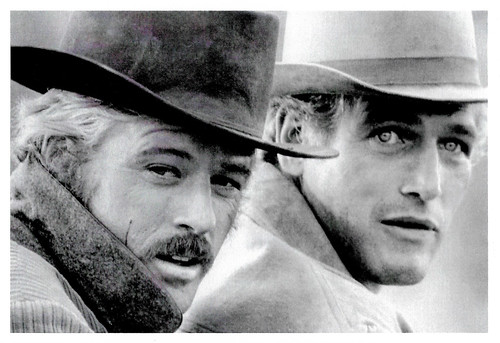
French postcard by INPI. Photo: Robert Redford and Paul Newman in Butch Cassidy and the Sundance Kid (George Roy Hill, 1969).
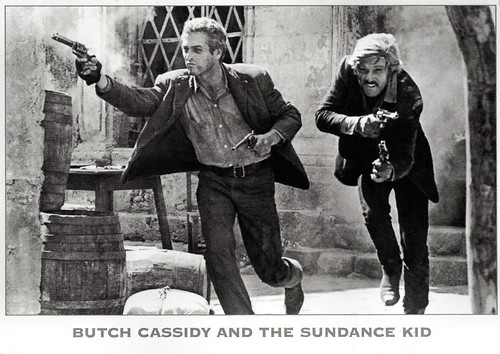
British postcard in the Film & Music Personalities series by Pyramid, Leicester, no. PC 2038. Paul Newman and Robert Redford in Butch Cassidy and the Sundance Kid (George Roy Hill, 1969).

German postcard by AGI, Staufenberg, no. CP 751. Robert Redford in Butch Cassidy and the Sundance Kid (George Roy Hill, 1969).

American postcard, no. MPC 903-50. Photo: Robert Redford in The Sting (George Roy Hill, 1973).

Canadian postcard by Canadian Postcard, no. A 228. Mia Farrow and Robert Redford in The Great Gatsby (Jack Clayton, 1974).
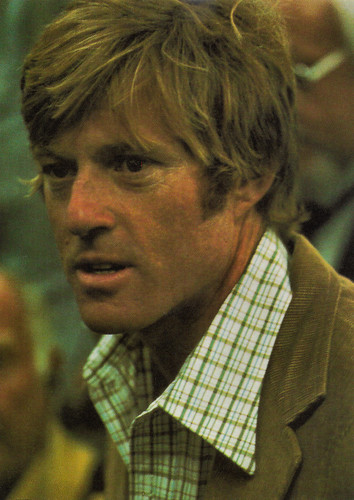
British postcard by Heroes, London, no. PC 593. Photo: Robert Redford in All the President's Men (Alan J. Pakula, 1976).

Romanian postcard by Casa Filmului Acin, no. 43080. Photo: Robert Redford in All the President's Men (Alan J. Pakula, 1976).
Robert Redford continued his involvement in mainstream Hollywood movies, though with a newfound focus on directing. The first film he directed was Ordinary People (1980), which starred Mary Tyler Moore, Donald Sutherland, and Timothy Hutton. The film followed the disintegration of an upper-class American family after the death of a son and was one of the most critically and publicly acclaimed films of the decade. It won several Oscars, including the Academy Awards for Best Picture and Best Director, Redford's first Oscar. His follow-up directorial project, The Milagro Beanfield War (1987), failed to generate the same level of attention. Out of Africa (Sydney Pollack, 1985), with Redford and Meryl Streep, became an enormous critical and box office success and won seven Oscars, including Best Picture. It was Redford's biggest success of the decade and Redford and Pollack's most successful film together.
Redford continued as a major star throughout the 1990s and 2000s. His third film as a director, A River Runs Through It (1992), with the young Brad Pitt, was a mainstream success. Then, he starred in Indecent Proposal (Adrian Lyne, 1993) as a millionaire businessman who tests a couple's (Demi Moore and Woody Harrelson) morals. It became one of the year's biggest hits. His film Quiz Show (Robert Redford, 1994), starring Ralph Fiennes and Rob Morrow, explored the real-life corruption of the 1950s game shows. It earned him another Oscar nomination for Best Director. He co-starred with Michelle Pfeiffer in the newsroom romance Up Close & Personal (Jon Avnet, 1996), and with Kristin Scott Thomas in The Horse Whisperer (1998), which he also directed and produced.
Redford continued to work in films with political contexts, such as Havana (Sydney Pollack, 1990), playing Jack Weil, a professional gambler in 1959 Cuba during the Revolution, as well as the caper Sneakers (Phil Alden Robinson, 1992), with River Phoenix. He reteamed with Brad Pitt for Spy Game (Tony Scott, 2001). Redford stepped back into producing with The Motorcycle Diaries (Walter Salles, 2004), a coming-of-age road film about a young medical student, Ernesto 'Che' Guevara, and his friend Alberto Granado. He reteamed with Meryl Streep 22 years after they starred in Out of Africa, for his personal project, the political drama Lions for Lambs (Robert Redford, 2007), which also starred Tom Cruise. The film was a commercial and critical disappointment.
Redford gave an impressive performance in All Is Lost (J.C. Chandor, 2013) as a man caught in dire, life-threatening circumstances, alone sailing at sea. He received very high acclaim for his role in the film, in which he is the only cast member and has almost no dialogue. Next, he appeared in the Marvel Studios superhero film Captain America: The Winter Soldier (Anthony Russo, Joe Russo, 2014) playing Alexander Pierce. More recently, he appeared in A Walk in the Woods (Ken Kwapis, 2015) with Nick Nolte and Emma Thompson, and Truth (James Vanderbilt, 2015) as real-world TV journalist Dan Rather and 60 Minutes' controversial coverage of George W. Bush's military service. Since then, he played in The Discovery (Charlie McDowell, 2017) with Mary Steenburgen, and Avengers: Endgame (Anthony Russo, Joe Russo, 2019) with Robert Downey Jr.
In 2018, Redford announced that his starring role in the upcoming crime comedy The Old Man & the Gun (David Lowery, 2018) would bring his long and distinguished acting career to a close. The film is based on the true story of Forrest Tucker, from his audacious escape from San Quentin at the age of 70 to an unprecedented string of heists that confounded authorities and enchanted the public. The Little Songbird at IMDb: "Redford piles on the likeability and charm with effortless ease, really terrific work in a performance that dominates in a good way the film, and some of his best in years." Between 1958 and 1985, Robert Redford was married to Lola Van Wagenen. The couple had four children: Scott Anthony (1959 - he died of sudden infant death syndrome, aged 2½ months), painter Shauna Jean Redford (1960), writer and producer David 'Jamie' James (1962), and director and producer Amy Hart Redford (1970). Redford had seven grandchildren. In 2009, Redford married his long-time partner, German painter Sibylle Szaggars. The Academy of Motion Picture Arts and Sciences recognised his contributions to the medium in 2001 with an honorary award for serving as an "inspiration to independent and innovative filmmakers everywhere." In 2011, Alfred A. Knopf published 'Robert Redford: The Biography' by Michael Feeney Callan, written over fifteen years with Redford's input, and drawn from his personal papers and diaries. In 2016, Redford was awarded the Presidential Medal of Freedom by President Barack Obama.
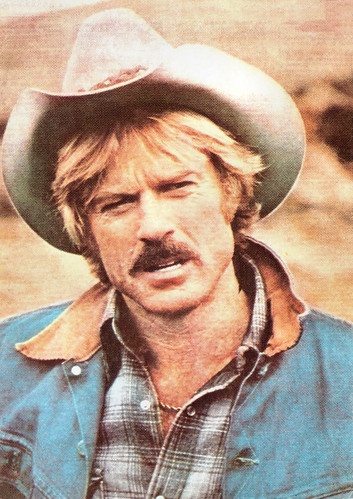
Romanian postcard by Casa Filmului Acin. Photo: Robert Redford in The Electric Horseman (Sydney Pollack, 1979).
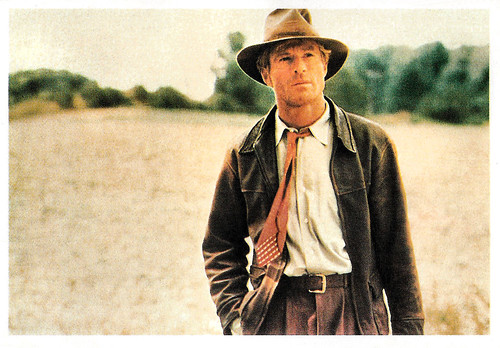
French postcard by Ébullitions, no. 15. Robert Redford in Out of Africa (Sydney Pollack, 1985).

Vintage photo. Meryl Streep and Robert Redford in Out of Africa (Sydney Pollack, 1985).
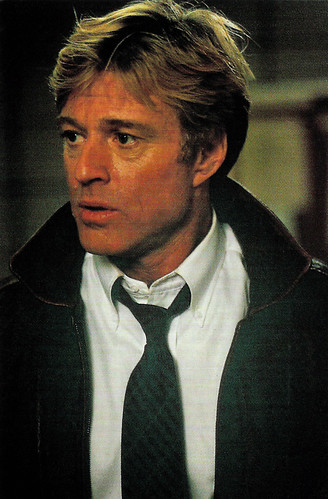
Dutch collectors card, 1987. Photo: Robert Redford in Legal Eagles (Ivan Reitman, 1986).
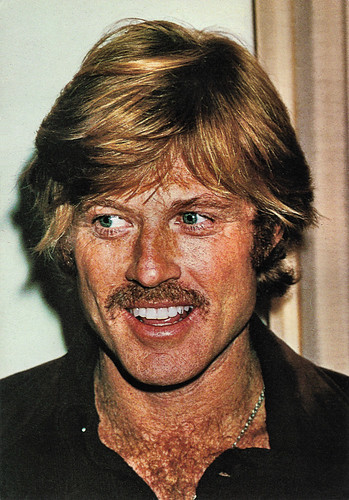
Italian postcard by Photocards Edizioni Beatrice D'Este / Arti Grafiche Riccordi S.p.A, Milano, no. 20166.
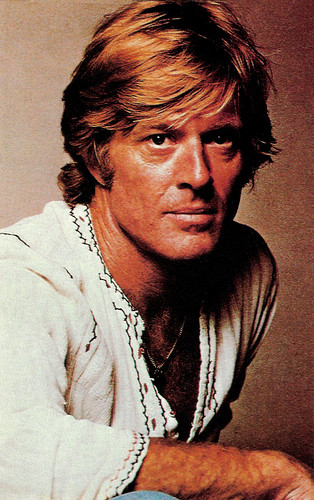
American postcard by Coral-Lee, Rancho Cordova, CA, no. CL/Personality # 119.
Sources: Gustaf Molin (IMDb), The Little Songbird (IMDb), Biography.com, Wikipedia, and IMDb.

Canadian postcard by Fan Club, no. PC8.

American postcard by Fan Club Post Cards, New York, N.Y., no. PC 22. Paul Newman and Robert Redford in Butch Cassidy and the Sundance Kid (George Roy Hill, 1969).

French postcard in the Collection 'Portraits de Cinema' by Editions Admira, Aix-en-Provence, Serie 6, no. 1 / no. PHN 863. Photo: SNAP Photo / Cosmos. Robert Redford in The Sting (George Roy Hill, 1973).

British postcard by Star-Graphics, London, no. S 90. Sent by mail in 1997. Robert Redford in The Electric Horseman (Sydney Pollack, 1979).

French postcard by Media Comm +, no. F.K. 34. Robert Redford in The Natural (Barry Levinson, 1984).

Italian postcard by Vitorius Roma, no. VR 499. Robert Redford in Out of Africa (Sydney Pollack, 1985).

Vintage postcard. Photo: Universal / UIP. Robert Redford in Legal Eagles (Ivan Reitman, 1986).
Jane Fonda's stuffy newlywed husband
Charles Robert Redford Jr. was born in Santa Monica, California, in 1936. His parents were Martha W. (Hart) and Charles Robert Redford, Sr., a milkman who later worked as an accountant for an oil company. Redford's family moved to Van Nuys, California, while his father worked in El Segundo. He attended Van Nuys High School and was interested in art and sports. In 1954, Redford graduated from Van Nuys High School. But his mother died in 1955 from septicemia, and a deeply grieving Redford felt lost emotionally.
Redford won a baseball scholarship to the University of Colorado, but he did not distinguish himself as an athlete there. Instead, "I became the campus drunk and blew out before I could ever get going," he told People magazine in a 1998 interview. After one and a half years, he decided to become an artist and moved to Europe. His time travelling through Europe was an eye-opening experience for the young Redford, who lived the life of a bohemian. When he returned to America a year and a half later, he was much more focused on my country culturally and politically. He decided on a career as a theatrical designer in New York City, but enrolled at the Pratt Institute and then the American Academy of Dramatic Arts, switching from design to acting.
In 1959, Redford's acting career began on stage, making his Broadway debut with a small role in the comedy 'Tall Story'. It was followed by parts in 'The Highest Tree' (1959) and 'Sunday in New York' (1961). On TV, he appeared as a guest star on numerous programs, including Maverick (1960), Perry Mason (1960), The Twilight Zone (1962), and The Untouchables (1963). Redford earned an Emmy nomination as Best Supporting Actor for his performance in The Voice of Charlie Pont (Robert Ellis Miller, 1962), starring Bradford Dillman.
Redford made his screen debut in War Hunt (Denis Sanders, 1962), set during the last days of the Korean War. This film also marked the acting debut of director Sydney Pollack, with whom Redford would collaborate on seven films. His biggest Broadway success was as the stuffy newlywed husband of Elizabeth Ashley in Neil Simon's 'Barefoot in the Park' (1963), directed by Mike Nichols. After this smash hit, he was cast in larger film roles. In the war comedy Situation Hopeless ... But Not Serious (Gottfried Reinhardt, 1965) with Alec Guinness, he played a soldier who had to spend years of his life hiding behind enemy lines.
In Inside Daisy Clover (Robert Mulligan, 1965), he played a bisexual movie star who marries starlet Natalie Wood. It won him a Golden Globe for the best new star. A success was This Property Is Condemned (Sydney Pollack, 1966), again with Natalie Wood. The same year, he co-starred with Jane Fonda in The Chase (Arthur Penn, 1966), also with Marlon Brando. Fonda and Redford were paired again in the film version of Barefoot in the Park (Gene Saks, 1967) and were again co-stars much later in The Electric Horseman (Sydney Pollack, 1979).

Romanian postcard by Casa Filmului Acin, no. 633. Jane Fonda and Robert Redford in Barefoot in the Park (Gene Saks, 1967).

French postcard by Editions F. Nugeron, no. Stars 69. Photo: J. Ritchie.

Romanian postcard by Casa Filmului Acin.

Romanian postcard by Casa Filmului Acin.

Romanian postcard by Casa Filmului Acin, no. 491. Photo: Barbra Streisand and Robert Redford in The Way We Were (Sydney Pollack, 1973).

Romanian postcard by Casa Filmului Acin.
Against the stereotype of the blond 'All American'
After this initial success, Robert Redford became concerned about his stereotype image of the blond 'All American'. At the age of 32, he found the property he was looking for in Butch Cassidy and the Sundance Kid (George Roy Hill, 1969), scripted by William Goldman. For the first time, he was teamed with Paul Newman. In the film, he played the outlaw known as the Sundance Kid while Newman portrayed Butch Cassidy. The two proved to be a dynamic duo onscreen and forged a lasting friendship, with the film enjoying both critical and commercial success. Butch Cassidy and the Sundance Kid made him a major bankable star.
Redford sought out more challenging fare and avoided trading on his sex appeal. Critical and box office hits were Jeremiah Johnson (Sydney Pollack, 1972), the hugely popular period drama The Way We Were (Sydney Pollack, 1973) with Barbra Streisand, and the blockbuster crime caper The Sting (George Roy Hill, 1973), the biggest hit of his career, for which Redford received his first Oscar nomination.
Between 1974 and 1976, exhibitors voted Redford as Hollywood's top box-office name with such hits as The Great Gatsby (Jack Clayton, 1974) and the CIA thriller Three Days of the Condor (Sydney Pollack, 1975) with Faye Dunaway.
The popular and acclaimed All the President's Men (Alan J. Pakula, 1976), scripted once again by William Goldman, was a landmark film for Redford. He and Dustin Hoffman played reporters Bob Woodward and Carl Bernstein in an acclaimed drama about the Watergate scandal. He was also the executive producer, and the film's serious subject matter and its attempt to create a realistic portrayal of journalism reflected the actor's offscreen concerns for political causes.
Redford also appeared in the war film A Bridge Too Far (Richard Attenborough, 1977) before starring in the prison drama Brubaker (Stuart Rosenberg, 1980), playing a prison warden attempting to reform the system, and the baseball drama The Natural (Barry Levinson, 1984). With his enormous salary, he acquired Utah property, which he transformed into a ranch and the Sundance ski resort. In 1980, he established the Sundance Institute for aspiring filmmakers. Its annual film festival has now become one of the world's most influential.

French postcard by INPI. Photo: Robert Redford and Paul Newman in Butch Cassidy and the Sundance Kid (George Roy Hill, 1969).

British postcard in the Film & Music Personalities series by Pyramid, Leicester, no. PC 2038. Paul Newman and Robert Redford in Butch Cassidy and the Sundance Kid (George Roy Hill, 1969).

German postcard by AGI, Staufenberg, no. CP 751. Robert Redford in Butch Cassidy and the Sundance Kid (George Roy Hill, 1969).

American postcard, no. MPC 903-50. Photo: Robert Redford in The Sting (George Roy Hill, 1973).

Canadian postcard by Canadian Postcard, no. A 228. Mia Farrow and Robert Redford in The Great Gatsby (Jack Clayton, 1974).

British postcard by Heroes, London, no. PC 593. Photo: Robert Redford in All the President's Men (Alan J. Pakula, 1976).

Romanian postcard by Casa Filmului Acin, no. 43080. Photo: Robert Redford in All the President's Men (Alan J. Pakula, 1976).
A newfound focus on directing
Robert Redford continued his involvement in mainstream Hollywood movies, though with a newfound focus on directing. The first film he directed was Ordinary People (1980), which starred Mary Tyler Moore, Donald Sutherland, and Timothy Hutton. The film followed the disintegration of an upper-class American family after the death of a son and was one of the most critically and publicly acclaimed films of the decade. It won several Oscars, including the Academy Awards for Best Picture and Best Director, Redford's first Oscar. His follow-up directorial project, The Milagro Beanfield War (1987), failed to generate the same level of attention. Out of Africa (Sydney Pollack, 1985), with Redford and Meryl Streep, became an enormous critical and box office success and won seven Oscars, including Best Picture. It was Redford's biggest success of the decade and Redford and Pollack's most successful film together.
Redford continued as a major star throughout the 1990s and 2000s. His third film as a director, A River Runs Through It (1992), with the young Brad Pitt, was a mainstream success. Then, he starred in Indecent Proposal (Adrian Lyne, 1993) as a millionaire businessman who tests a couple's (Demi Moore and Woody Harrelson) morals. It became one of the year's biggest hits. His film Quiz Show (Robert Redford, 1994), starring Ralph Fiennes and Rob Morrow, explored the real-life corruption of the 1950s game shows. It earned him another Oscar nomination for Best Director. He co-starred with Michelle Pfeiffer in the newsroom romance Up Close & Personal (Jon Avnet, 1996), and with Kristin Scott Thomas in The Horse Whisperer (1998), which he also directed and produced.
Redford continued to work in films with political contexts, such as Havana (Sydney Pollack, 1990), playing Jack Weil, a professional gambler in 1959 Cuba during the Revolution, as well as the caper Sneakers (Phil Alden Robinson, 1992), with River Phoenix. He reteamed with Brad Pitt for Spy Game (Tony Scott, 2001). Redford stepped back into producing with The Motorcycle Diaries (Walter Salles, 2004), a coming-of-age road film about a young medical student, Ernesto 'Che' Guevara, and his friend Alberto Granado. He reteamed with Meryl Streep 22 years after they starred in Out of Africa, for his personal project, the political drama Lions for Lambs (Robert Redford, 2007), which also starred Tom Cruise. The film was a commercial and critical disappointment.
Redford gave an impressive performance in All Is Lost (J.C. Chandor, 2013) as a man caught in dire, life-threatening circumstances, alone sailing at sea. He received very high acclaim for his role in the film, in which he is the only cast member and has almost no dialogue. Next, he appeared in the Marvel Studios superhero film Captain America: The Winter Soldier (Anthony Russo, Joe Russo, 2014) playing Alexander Pierce. More recently, he appeared in A Walk in the Woods (Ken Kwapis, 2015) with Nick Nolte and Emma Thompson, and Truth (James Vanderbilt, 2015) as real-world TV journalist Dan Rather and 60 Minutes' controversial coverage of George W. Bush's military service. Since then, he played in The Discovery (Charlie McDowell, 2017) with Mary Steenburgen, and Avengers: Endgame (Anthony Russo, Joe Russo, 2019) with Robert Downey Jr.
In 2018, Redford announced that his starring role in the upcoming crime comedy The Old Man & the Gun (David Lowery, 2018) would bring his long and distinguished acting career to a close. The film is based on the true story of Forrest Tucker, from his audacious escape from San Quentin at the age of 70 to an unprecedented string of heists that confounded authorities and enchanted the public. The Little Songbird at IMDb: "Redford piles on the likeability and charm with effortless ease, really terrific work in a performance that dominates in a good way the film, and some of his best in years." Between 1958 and 1985, Robert Redford was married to Lola Van Wagenen. The couple had four children: Scott Anthony (1959 - he died of sudden infant death syndrome, aged 2½ months), painter Shauna Jean Redford (1960), writer and producer David 'Jamie' James (1962), and director and producer Amy Hart Redford (1970). Redford had seven grandchildren. In 2009, Redford married his long-time partner, German painter Sibylle Szaggars. The Academy of Motion Picture Arts and Sciences recognised his contributions to the medium in 2001 with an honorary award for serving as an "inspiration to independent and innovative filmmakers everywhere." In 2011, Alfred A. Knopf published 'Robert Redford: The Biography' by Michael Feeney Callan, written over fifteen years with Redford's input, and drawn from his personal papers and diaries. In 2016, Redford was awarded the Presidential Medal of Freedom by President Barack Obama.

Romanian postcard by Casa Filmului Acin. Photo: Robert Redford in The Electric Horseman (Sydney Pollack, 1979).

French postcard by Ébullitions, no. 15. Robert Redford in Out of Africa (Sydney Pollack, 1985).

Vintage photo. Meryl Streep and Robert Redford in Out of Africa (Sydney Pollack, 1985).

Dutch collectors card, 1987. Photo: Robert Redford in Legal Eagles (Ivan Reitman, 1986).

Italian postcard by Photocards Edizioni Beatrice D'Este / Arti Grafiche Riccordi S.p.A, Milano, no. 20166.

American postcard by Coral-Lee, Rancho Cordova, CA, no. CL/Personality # 119.
Sources: Gustaf Molin (IMDb), The Little Songbird (IMDb), Biography.com, Wikipedia, and IMDb.
No comments:
Post a Comment